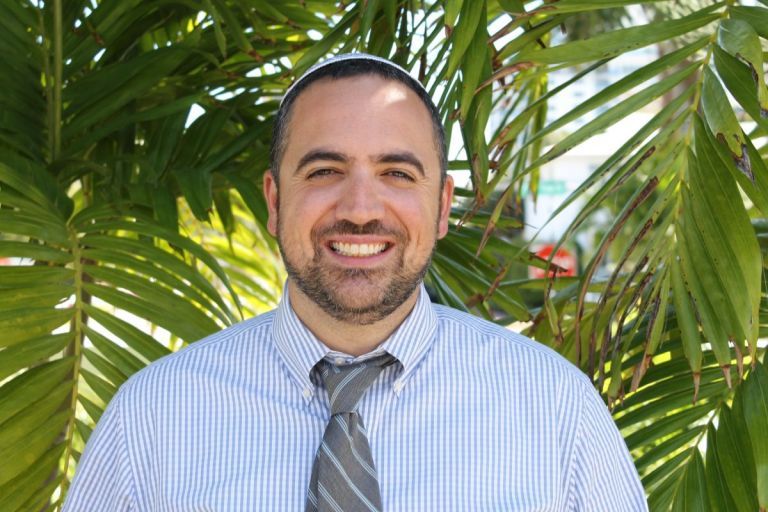From the Desk of Rabbi Aharon Assaraf: Caught Off Guard

You never know when your values, character or training will be put to the test. As an educator for the last 12 years, I often struggle with the idea that since you “teach the way of Torah”, you are expected to exemplify all of its requirements and expectations. I would like to share an episode that shook me to the core last Shabbat, and showed me my vulnerabilities. Before I jump into the story, I must begin by saying that just a few days ago we marked the shloshim (30 day period) after the burial of our dear student, Sammy Farkas a”h, and I am reminded that although we may be harsh on how we judge ourselves, life is too precious to linger in the unknown. We need to live life to its fullest, and this includes moving on from making mistakes and build yourself up for the next time a similar challenge comes along.
Last Friday night I was walking home back from services with my son and a friend and in the near distance I see an elderly man who was decked in full chassidish garb making his way to us. As my friend and I were in a serious conversation, I didn’t even notice that the gentleman was pacing slowly at us and eventually stopped right in front of us. Without any initial greetings, this man mumbled a few words with a strong accent that sounded like “Seudas Shabbos, Seudas Shabbos!!?” I was caught off guard and continued to speak with my friend, thinking this person was simply disoriented and will make his way past us. After five more seconds, he once again repeated the same two words. At that point I was a little uncomfortable and basically said “sorry, not sure what you’re asking/looking for” and continued speaking with my friend.
The gentleman turned around and walked away. That’s when the Jewish guilt began to pierce me. Did I just turn away a guy who needs a Shabbat meal?! Is this really the kind of Judaism I live, a different one than I preach and teach?! All of these types of questions were running through my head. As I looked up the street, the man was already a few blocks away and the guilt would have to remain with me all of Shabbat. A few minutes later I say goodbye to my friend and make my way to my home. As I am slowly approaching the start of my block, I see in the distance my brother standing on the street in front of my house. As I get closer, I see that he is having a conversation with someone, but I’m still too far to recognize who. Low and behold I’m standing ten feet away, and here is my brother having a conversation with the same man I turned away moments ago. My guilt quickly turned into joy, and I signal to the guy “you must need a Shabbat meal, please join us”. The man, begins to laugh and realizes I am the one he saw a few minutes before and he exclaims “Oh how Hashem is awesome, there must be a reason why we need to have this Shabbat meal together”. I didn’t pay any attention to what he really said, but my brother picked up on the oddity. My brother asks “Aharon, you know this man?”, I reply, yes, I saw him a few minutes ago. He continues, “So how did you know he needed a meal?”, I quickly replied, "Don’t worry, I’ll explain later, but you should know, Hashem was very kind to me, and gave me a second chance, a 'redemption' Mitzvah so to speak." I then paused and asked my brother, “Wait, you were standing on the street and suddenly saw this man?"
This is where the story reminds us who runs this world. After this gentleman walks away from me earlier in the evening, he heads down the block, he easily passed 30 homes before he reaches mine. For some “out of this world” reason, he goes directly to my home, and knocks on the door, and asks for a Shabbat meal. My brother, not being in his own home answers, it shouldn’t be an issue (to a complete stranger) but let’s wait by the street as my brother comes home, and I’m sure he will appreciate knowing about this before he enters his home.
When my brother realized that this man, who mysteriously knocked on the door, was the same man who saw me up the block 10 minutes prior, we both suddenly put on the face (as we look at each other) of “is this really one of those stories you hear about a Jew in the small village?”. We all enter the house and begin to sing Shalom Aleichem and my mind begins to wonder what all of this is about.
At one point during the start of the first course, this man stops and puts his soup spoon down and emphatically says, “Hakadosh Baruch Hu, must have wanted us to be together this Shabbat!”. At that point my Jewish guilt returned, and I began to criticize myself in my mind, and question why it is that I needed a second chance to perform such a meaningful mitzvah. I shook it off, and said to our guest what I knew would be the only way to start a real dialogue, I said, “I am really so so sorry that I did not capitalize on the amazing opportunity I had when you asked me for a meal, I am sorry you needed to walk ahead with that uncomfortable feeling of having to ask someone else down the street for a Shabbat meal, no one should need to do that as they visit a Jewish community from abroad, I am truly sorry”. He looked at me, and did not even waste a moment to give it any thought and he rapidly responds “It's the way Hashem pictured it happening, it was meant to be exactly this way!”
We had a beautiful Shabbat meal, and he shared inspiring words of Torah. He told us about his life and what he does for a living, etc. We walked him home after the meal, and we really enjoyed getting to know this special guest. All in all, I had one of the most meaningful Friday night meals ever.
I have shared this story with my students over the last few days, and even some adults in the community, but now I am writing about this experience to the broader audience because I think the lesson is so important. We have to work on the following items as observant Jews, and here are the points of emphasis.
-
Talk is cheap, action is way harder, learn how to train your mind and body that even though you know what is right, learn how to DO what is right.
-
Grown ups, Rabbis, teachers, and parents also make mistakes, and bad judgment calls. Take it in stride and be honest about those moments, and learn how to beat it next time it comes around.
-
Every scenario and every moment of your life there are opportunities to see how G-D has his hands in every little detail of every moment. It’s learning how to find it and expressing ourselves afterwards that matters more.
-
Being a good Jew is hard, and it requires work to master what the Torah asks of us. Spend more time learning what the Torah (ultimately G-D) wants of us, and take action.
-
As long as you’re in the mindset of a life learner, it's always ok to make mistakes, just look back every now and then, and try to fix those previous footprints. This is why learning Torah and G-D’s ways are so important, because that constant reminder will help pave your ways and decisions.
I am so grateful that I had such an impactful moment that I can learn from and share with more people (specifically my students). I have learned from this business that sharing vulnerabilities with students shows them my human side, and ultimately brings our relationship to more meaningful level. This particular vulnerability is going to stay with me for some time, but I am so grateful to Hashem that I actually got a second shot at it, and was able to perform a special mitzvah of Hachnasat Orchim (being hospitable). As a thank you and a way to show Hakarat HaTov (appreciation) to Hashem for this awesome test, I am sharing this story with as many people as I can to try and emphasize the importance of knowing G-D’s ways and his expectations, and also acting on those ways.
Shabbat Shalom,
Rabbi Aharon Assaraf
High School Assistant Principal

